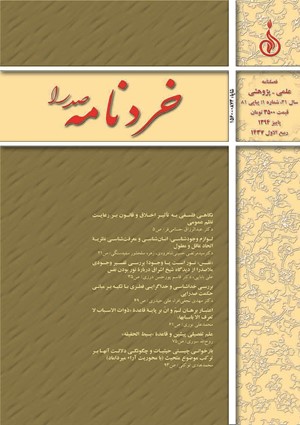بررسي خداشناسيو خداگرايي فطري با تكيه بر مباني حكمت صدرايي
محورهای موضوعی : ملاصدراپژوهی و اندیشۀ حکمت متعالیهمهدي نجفي افرا 1 , علي حيدري 2
1 - دانشگاه آزاد اسلامی
2 - دانشگاه شهيد رجايي تهران
کلید واژه: فطرت فقر وجودي خداشناسي فطري خداگرايي فطري ,
چکیده مقاله :
فطرت يكي از مباني مهم در انسانشناسي ديني است. از آنجايي كه انسان محور همة علوم انساني است، اعتقاد به انسانشناسي فطري موجب جهتگيري خاصي در اين علوم ميگردد. فطرت انساني همان هستي خاص انسان است كه لوازم و ويژگيهاي خاصي را در پي دارد كه از آنها بعنوان فطريات يا ويژگيهاي فطري ياد ميشود. خداشناسي و خداگرايي فطري از مهمترين مصاديق فطرياتند. نوع نگاه به فطرت در انديشة اسلامي و غربي متفاوت است. برخي از انديشمندان مسلمان معتقد به خداگرايي فطري هستند و برخي ديگر به خداشناسي فطري معتقدند؛ از گروه دوم، برخي خداشناسي فطري را از سنخ علم حضوري ميشمارند و طيف ديگر آن را از سنخ علم حصولي ميدانند. بر اساس مباني مبرهن حكمت صدرايي، از جمله: اصالت وجود، فقر وجودي، وحدت تشكيكي يا شخصي دانستن هستي در پرتو تحليل عميق اصل عليت و نيز توجه به نامتناهي بودن هستي خداوند، ميتوان تبييني قابل دفاع از خداشناسي فطري، بمعناي علم حضوري و شهود دروني فقر و ربط به حق ارائه داد. با پذيرش اين زمينة فطري بسهولت زمينه براي استدلال و علم حصولي فطري، بمعناي بديهي غيراولي فراهم ميشود؛ استدلالهاي عقلي متعدد در اثبات وجود خدا، مؤيد بديهيغيراولي بودن خداشناسي حصولي است. در نهايت، با تبيين خداشناسي فطري، خداگرايي فطري ـ كشش دروني بسوي خداـ بهآساني تبيين ميشود، زيرا امكان ندارد موجودي فقر و نياز محض و عين ربط به كمال و جمال مطلق باشد ولي مجذوب جميل علي الاطلاق نگردد.
Fitrah (primordial nature) is one of the important foundations of religious anthropology. Since human being is at the center of all human sciences, the belief in fitri anthropology leads to a specific direction in such disciplines. Man’s primordial nature is the same particular existence of human beings which enjoys certain concomitants and characteristics which are referred to as fitri things. Natural deism and theism are among the most important referents of fitri things. The concept of Fitrah or primordial nature is viewed differently in Islamic and Western philosophies. Some Islamic thinkers believe in natural theism, and some others advocate natural deism. Some members of the second group consider natural deism to be of the type of presential knowledge, while some other members believe that it is of the kind of acquired knowledge. Based on the demonstrated principles of Sadrian philosophy, such as the principiality of being, existential indigence, the graded or individual unity of being in the light of a profound analysis of the principle of causality, as well as the attention to the infinity of God’s being, one can provide a justifiable explanation of natural deism in the sense of presential knowledge, the inner intuition of indigence, and the connection with the Truth. Through accepting this fitri background, the context for reasoning and intrinsic acquired knowledge in the sense of non-primal evident knowledge is easily provided. The existence of several intellectual arguments on demonstrating the existence of God reveals the non-primal nature of acquired theology. Finally, through explaining natural deism, natural theism - an inner attraction to God - is simply explicated. This is because it is impossible for an existent to be identical with pure indigence and need and but not to be attracted to Absolute Beauty.
قرآن كريم.#
نهج البلاغه، ترجمة محمد دشتي، قم، الهادي، 1380.#
جوادي آملي، عبدالله، «انسانشناسي فطري»، فصلنامة حوزه و دانشگاه، ش9، 1375.#
جوادي آملي، عبدالله، تبيين براهين اثبات خدا، قم، اسراء، 1374.#
جوادي آملي، عبدالله، فلسفه حقوق بشر، قم، اسراء، 1374.#
جوادي آملي، عبدالله، فلسفه صدرا، (تلخيص رحيق مختوم)، تحقيق و تنظيم محمدكاظم بادپا، قم، اسراء، 1388.#
جيمز، ويليام، دين و روان، ترجمه مهدي قايني، قم، دارالفكر، 1367.#
حسينزاده، محمّد، معرفت شناسي ديني (3)، قم، مؤسسه امام خميني (ره)، 1390.#
الراغب اصفهاني، أبي القاسم الحسين بن محمّد، المفردات، بيروت، دار احياء التراث العربي، 1428 هـ.#
الطّريحي، فخرالدين، مجمع البحرين، تحقيق السيّد احمد الحسيني، تهران، نشر فرهنگ اسلامي، 1408 هـ.#
عبوديت، عبدالرسول، درآمدي به نظام حكمت صدرايي، تهران، سمت، 1392.#
مصباح يزدي، محمدتقي، آموزش عقايد، تهران، شركت چاپ و نشر بينالملل، 1390.#
مصباح يزدي، محمدتقي، آموزش فلسفه، تهران، سازمان تبليغات اسلامي، 1372.#
مصباح يزدي، محمدتقي، معارف قرآن، قم، موسسه در راه حق1373.#
مطهري، مرتضي، اسلام و مقتضيات زمان، تهران، صدرا، 1374.#
مطهري، مرتضي، فطرت، تهران، صدرا، 1370.#
مطهري، مرتضي، مسئلة شناخت، تهران، صدرا، 1373.#
ملاصدرا، اسرار الايات و انوار البينات، تصحيح و تحقيق محمدعلي جاودان، تهران، بنياد حكمت اسلامي صدرا، 1389.#
ملاصدرا، الحكمةالمتعاليه في الأسفار الأربعه، ج2: تصحيح، تحقيق و مقدمه مقصود، محمدي، تهران، بنياد حكمت اسلامي صدرا، 1380.#
ملاصدرا، الشواهد الربوبيه في مناهج السلوكيه، تحقيق، تصحيح و مقدمه مصطفي محققداماد، بنياد حكمت اسلامي صدرا،1382.#
ملاصدرا، المبدا و المعاد في الحكمة المتعاليه، تصحيح، تحقيق و مقدمه محمد ذبيحي و جعفر شاهنظري، تهران، بنيادحكمت اسلامي صدرا، 1381.#
ملاصدرا، المظاهر الالهيه في اسرار العلوم الكماليه، تصحيح، تحقيق و مقدمه آيتالله سيدمحمد خامنهاي، تهران، بنياد حكمت اسلامي صدرا، .#
نجفيافرا، مهدي، «فطرت در آينه قرآن و برهان»، پژوهشنامه قرآن و حديث، ش3، 1386.#


